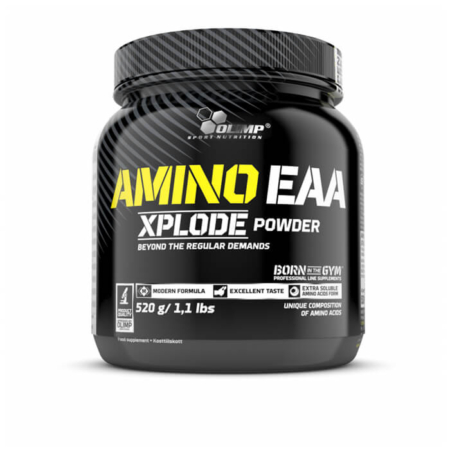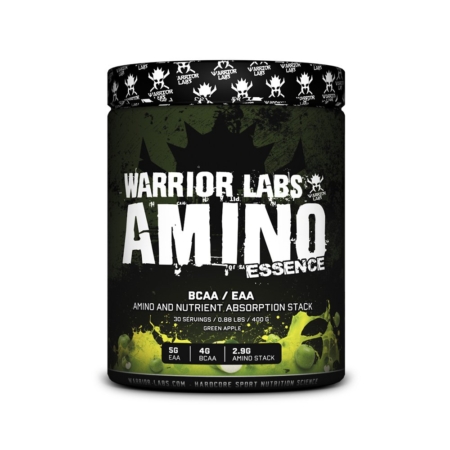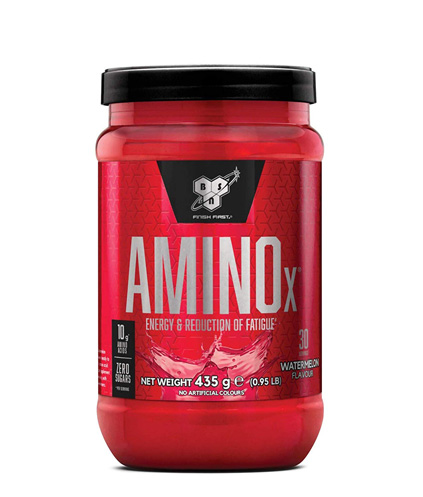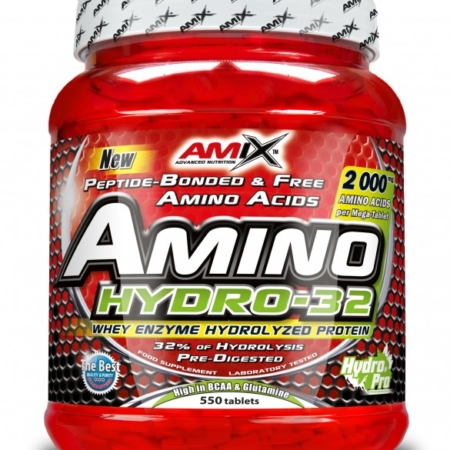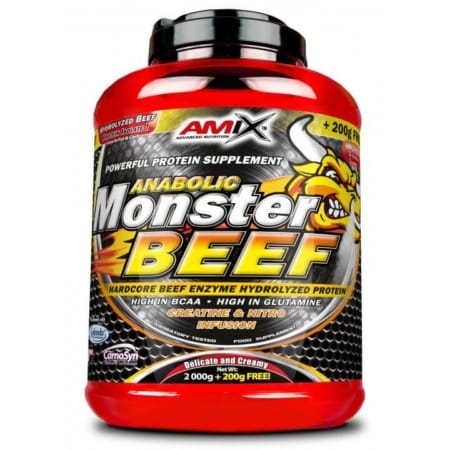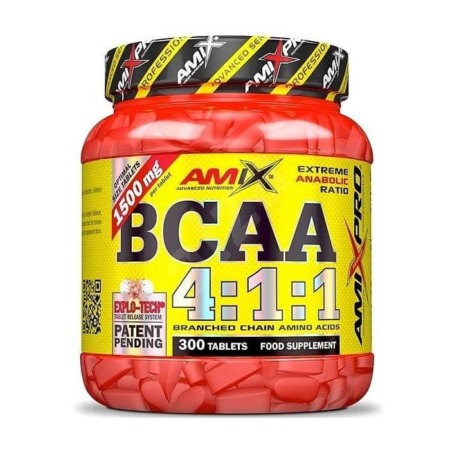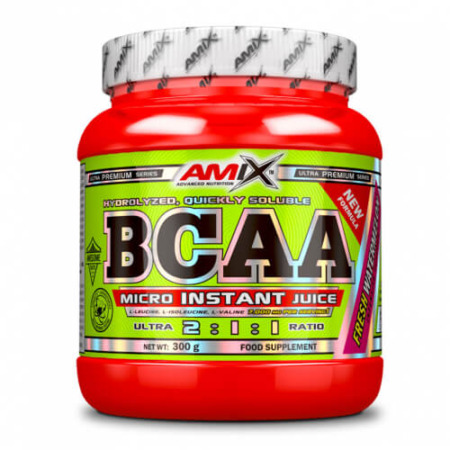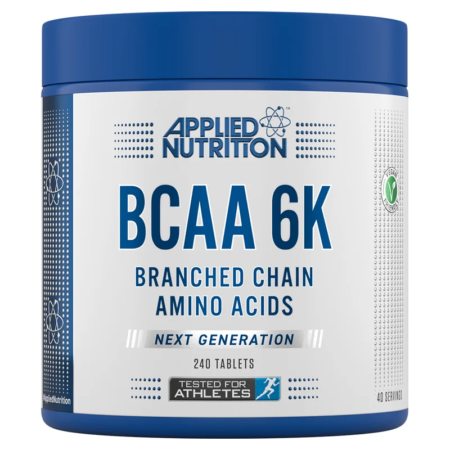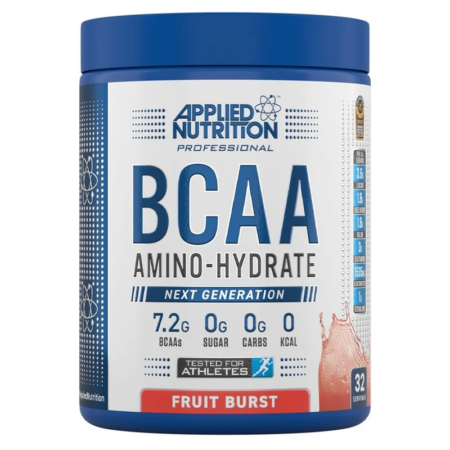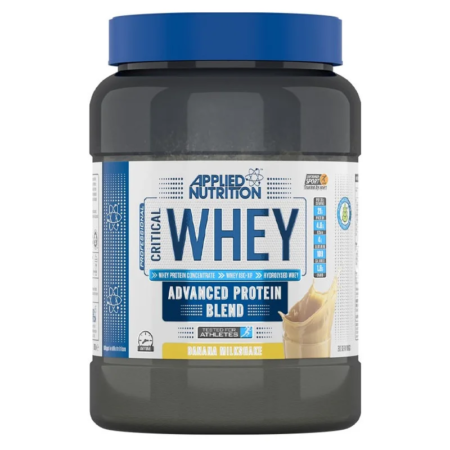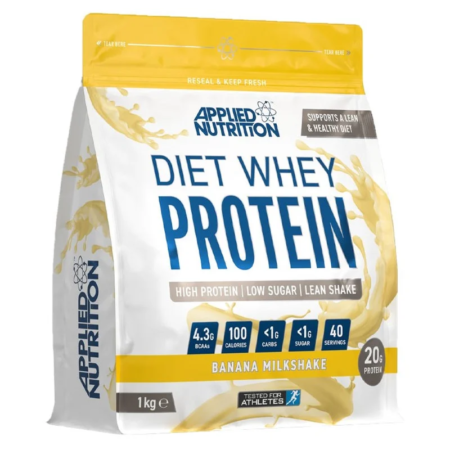BCAAs: what are branched-chain amino acids?
Branched-chain amino acid — short BCAAs — are the proteinogenic amino acids Leucine, Isoleucine, and Valine. They are categorized as essential amino acids, so they cannot be generated by the body itself and thus have to be taken in via suitable food.
BCAAs are contained in food such as bovine meat, chicken breast, raw salmon, chicken egg, nuts, maize wholemeal flour, rice and pulses, cow milk, peas, oat flakes, and wheat wholemeal flour.
Due to physical stress caused by endurance sports, martial arts, or weight training, an increased requirement of amino acids can occur. BCAAs in particular hold a special position because of their positive qualities and anabolic as well as anti-catabolic effect.
BCAA in weight training, martial arts, and endurance sports
Among athletes it is a well-established fact, that a shortage of amino acids impairs performance, while a proper supply has a positive effect on the development of muscles and regeneration. Amino acids offer various advantages and are helpful during the muscle development phase, the regeneration phase, as well as during diet, and they counteract muscle loss. BCAAs rank among the most favored and most important amino acids in sports, since in addition to energy management, they are really important for the muscles. More and more athletes take advantage of the performance-boosting effects of BCAAs.
Effects of BCAAs: muscle building and muscle maintenance
Since BCAAs have a positive influence on muscle building, they are particularly popular among endurance sportspeople, martial artists, bodybuilders, as well as all other athletes. For more than 50 years, BCAAs are used against muscular atrophy, that is muscle loss, as well as for muscle building.
Branched-chain amino acids — that is BCAAs — are quickly absorbed and utilized by the human body. Within 30 minutes, the BCAAs circulate in the blood, where they provide the body with the cellular components needed for developing muscles and regeneration directly.
Thus BCAAs are also a fast energy provider for your workout. Furthermore, branched-chain amino acids facilitate the development of muscles by inducing insulin releases. By taking in BCAAs, you are able to train longer and more intensively, because they slow down the muscles’ fatigue process.
BCAA diet: hardly any fat loss without them!
BCAAs are especially important during diets in particular. For example, they cause a reduction of catabolic (muscle-reducing) reactions and at the same time induce protein synthesis.
Thus BCAAs prevent the body from accessing its own protein reserves — which is musculature — in order to generate energy during a diet. That is why BCAAs are very important for protecting the muscles during a diet. That means that even during your diet and the calorie deficiency coming with it, you can continue training hard without entering a catabolic status.
A supplementation of BCAAs can lend you effective support throughout your diet. The release of the metabolic hormone T3 (Liothyronine) gets increased thanks to branched-chain amino acids. That leverages the metabolism.
During a diet, many people experience an increased feeling of hunger because the concentration of the hormone Leptin drops. Leptin is a hormone that tells the body when it is hungry. Taking BCAAs during a diet can activate the release of the natural appetite suppressant Leptin.
If you want to take BCAAs during a diet, you should pay attention to your BCAA product not containing any added sugar or carbohydrates in general – BCAA capsules usually are best suited for these situations.
Sports Nutrition: BCAA as a food supplement
Anybody training more than three times a week or being on a diet should take in BCAAs on a daily basis. Each of the three amino acids Leucine, Isoleucine, and Valine plays a vital role in your body. Thus anybody with an active and sporty daily routine can benefit from taking BCAAs. Leucine, Isoleucine, and Valine are each available separately. Oftentimes taking just a single amino acid is not expedient though, which is why supplements containing all three BCAAs are often far more effective.
Leucine
The essential, proteinogenic amino acid Leucine plays a significant role in the energy management within the muscular tissue. In weight training, Leucine finds use as a supplement for muscle development, inhibitor against the reduction of muscle protein, and to support regeneration processes. The daily requirement of Leucine for a healthy adult is about 35 mg Leucine per kg of body weight — depending on the method of estimation.
Isoleucine
Isoleucine, too, ranks among the essential amino acids and is physiologically important. It is necessary for building protein and also serves as a means of energy generation in muscle cells. That is important when taking in food rich in proteins, over periods of stress, as well as when during phases of hunger the body’s own reserves have to be fallen back on. The estimate of the daily requirement for healthy adults is about 20 mg Isoleucine per kg of body weight.
Valine
Among the branched-chain, essential amino acids also ranks Valine, contained in minor amounts in all important proteins. Valine, too, plays a key role in nourishing the muscle and serves as an energy supplier. Due to it inducing the release of insulin, Valine ensures a swift absorption of all amino acids by the musculature. The daily requirement for a healthy adult is about 25 mg Valine per kg of body weight.
BCAA dosing and intake
If you train more often than three times a week, you should take in BCAAs on a daily basis. For if you train intensively — especially in case of tough lifting and long endurance sessions — your requirement of BCAA may be increased.
In contrast to many other amino acids, BCAAs are almost immediately accessible by your muscles after the intake. Valine, Leucine, and Isoleucine do not need to be converted via the liver, but go straight into the blood. That is why you should take BCAAs right before training. That way you make sure your musculature will be supplied with energy and can train longer and more intensively.
However, you should take in BCAAs also in the morning, after training, or on free days since they counteract muscle loss.
The exact dosage can be learned from the respective BCAA supplement.
Buy BCAA
There is a whole variety of different BCAA supplements on the market. The motto has to be, quality over quantity! Pay close attention to the ingredients contained in order to find the best food supplement for you. The combination of the three BCAAs is of particular importance. Often can be found: Leucine, Isoleucine, Valine in a 2:1:1 ratio. Since Leucine promises the biggest anti-catabolic and anabolic effect, this amino acid is dosed higher. There are also BCAA supplements with ratios of up to 10:1:1 though.
Usually BCAAs are sold as capsules or pills. BCAA powder with different flavors to be dissolved in water can be found as well though.
BCAA powder, BCAA pills and capsules
BCAA powder can be dissolved either in water or fitness drinks. You should always stir and shake properly and then let the mix rest for a while before shaking it again in order to dissolve the BCAA powder optimally in the liquid. An advantage of BCAA powder is that it gets digested very quickly and thus is available to your body quickly.
BCAA capsules and BCCA pills often contain a higher percentage of amino acids since in contrast to many powders they do without flavoring. BCAA capsules normally taste neutral and are very easy regarding intake and dosing. Often no sugar and other carbohydrates are used in BCAA pills or BCAA capsules, making them particularly suited for diets.
If we may support you in picking the right BCAA supplement, we are looking forward to hearing from you!
Our customers are also interested in Ephedrine HCL and our ECA Stack for sale. You should also have a look at our other supplements like Whey Protein and Fatburner Capsules.
Fatburners.at @ Social Media: LIKE & FOLLOW US!!





